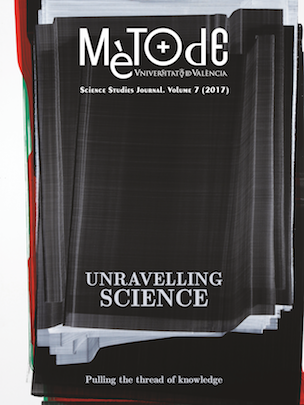Evolutionary biology and beliefs: How ideology can draw different social stances from science
DOI:
https://doi.org/10.7203/metode.7.7611Keywords:
social Darwinism, Herbert Spencer, Charles Darwin, Alfred Russel Wallace, Adolf Hitler Abstract
Abstract
Agreeing that there are often strong connections between fields of science and the ideological convictions of those producing the science, this essay shows that the connections are often complex and rarely straightforward. Taking the example of evolutionary biology, by looking at three key figures – Herbert Spencer, Charles Darwin and Alfred Russel Wallace – it is shown how very different social beliefs can lead to very different social conclusions being drawn from one’s science. It is argued that this message should be kept firmly in mind by those who today would draw social conclusions from science, for instance suggesting that Darwinian evolutionary biology leads straight to the social philosophy of the Third Reich. The truth is always far more complex.
 Downloads
Downloads
 References
References
Bannister, R. (1979). Social Darwinism: Science and myth in Anglo-American social thought. Philadelphia: Temple University Press.
Darwin, C. (1859). On the origin of species by means of natural selection, or the preservation of favoured races in the struggle for life. London: John Murray.
Darwin, C. (1871). The descent of man, and selection in relation to sex. London: John Murray.
Darwin, C. (1985). The correspondence of Charles Darwin. Cambridge: Cambridge University Press.
Gould, S. J. (1981). The mismeasure of man. New York: Norton.
Harrington, A. (1999). Reenchanted science: Holism in German culture from Wilhelm II to Hitler. Princeton, NJ: Princeton University Press.
Hitler, A. (1925). Mein Kampf. London: Secker and Warburg.
Huxley, J. S. (1934). If I were dictator. New York and London: Harper and Brothers.
Johnson, P. E. (1995). Reason in the balance: The case against naturalism in science, law and education. Downers Grove, IL: InterVarsity Press.
LeVay, S. (2010). Gay, straight, and the reason why: The science of sexual orientation. Oxford: Oxford University Press.
Lewontin, R. C. (1991). Biology as ideology: The doctrine of DNA. Toronto: Anansi.
Plantinga, A. (2011). Where the conflict really lies: Science, religion, and naturalism. New York: Oxford University Press.
Popper, K. R. (1972). Objective knowledge. Oxford: Oxford University Press.
Richards, R. J. (1987). Darwin and the emergence of evolutionary theories of mind and behavior. Chicago: University of Chicago Press.
Richards, R. J. (2013). Was Hitler a Darwinian? Disputed questions in the history of evolutionary theory. Chicago: University of Chicago Press.
Richards, R. J., & Ruse, M. (2016). Debating Darwin. Chicago: University of Chicago Press.
Ruse, M. (2016). Darwinism as religion: What literature tells us about evolution. Oxford: Oxford University Press.
Segerstrale, U. (1986). Colleagues in conflict: An in vitro analysis of the sociobiology debate. Biology and Philosophy, 1, 53–88. doi: 10.1007/BF00127089
Spencer, H. (1851). Social statics; or the conditions essential to human happiness specified and the first of them developed. London: J. Chapman.
Spencer, H. (1857). Progress: Its law and cause. Westminster Review, LXVII, 244–267.
Spencer, H. (1879). The data of ethics. London: Williams and Norgate.
Wallace, A. R. (1900). Studies: Scientific and social. London: Macmillan.
Wallace, A. R. (1905). My life: A record of events and opinions. London: Chapman and Hall.
Weikart, R. (2004). From Darwin to Hitler: Evolutionary ethics, eugenics, and racism in Germany. New York: Palgrave Macmillan.
Whitcomb, J. C., & Morris, H. M. (1961). The Genesis flood: The biblical record and its scientific implications. Philadelphia: Presbyterian and Reformed Publishing Company.
Wilson, E. O. (1975). Sociobiology: The new synthesis. Cambridge, MA: Harvard University Press.
Wilson, E. O. (1978). On human nature. Cambridge, MA: Harvard University Press.
Young, R. M. (1985). Darwin’s metaphor: Nature’s place in Victorian culture. Cambridge, MA: Cambridge University Press.
Downloads
Published
How to Cite
-
Abstract1156
-
PDF473
Issue
Section
License
![]()
All the documents in the OJS platform are open access and property of their respective authors.
Authors publishing in the journal agree to the following terms:
- Authors keep the rights and guarantee Metode Science Studies Journal the right to be the first publication of the document, licensed under a Creative Commons Attribution-NonCommercial-NoDerivatives 4.0 International License that allows others to share the work with an acknowledgement of authorship and publication in the journal.
- Authors are allowed and encouraged to spread their work through electronic means using personal or institutional websites (institutional open archives, personal websites or professional and academic networks profiles) once the text has been published.





